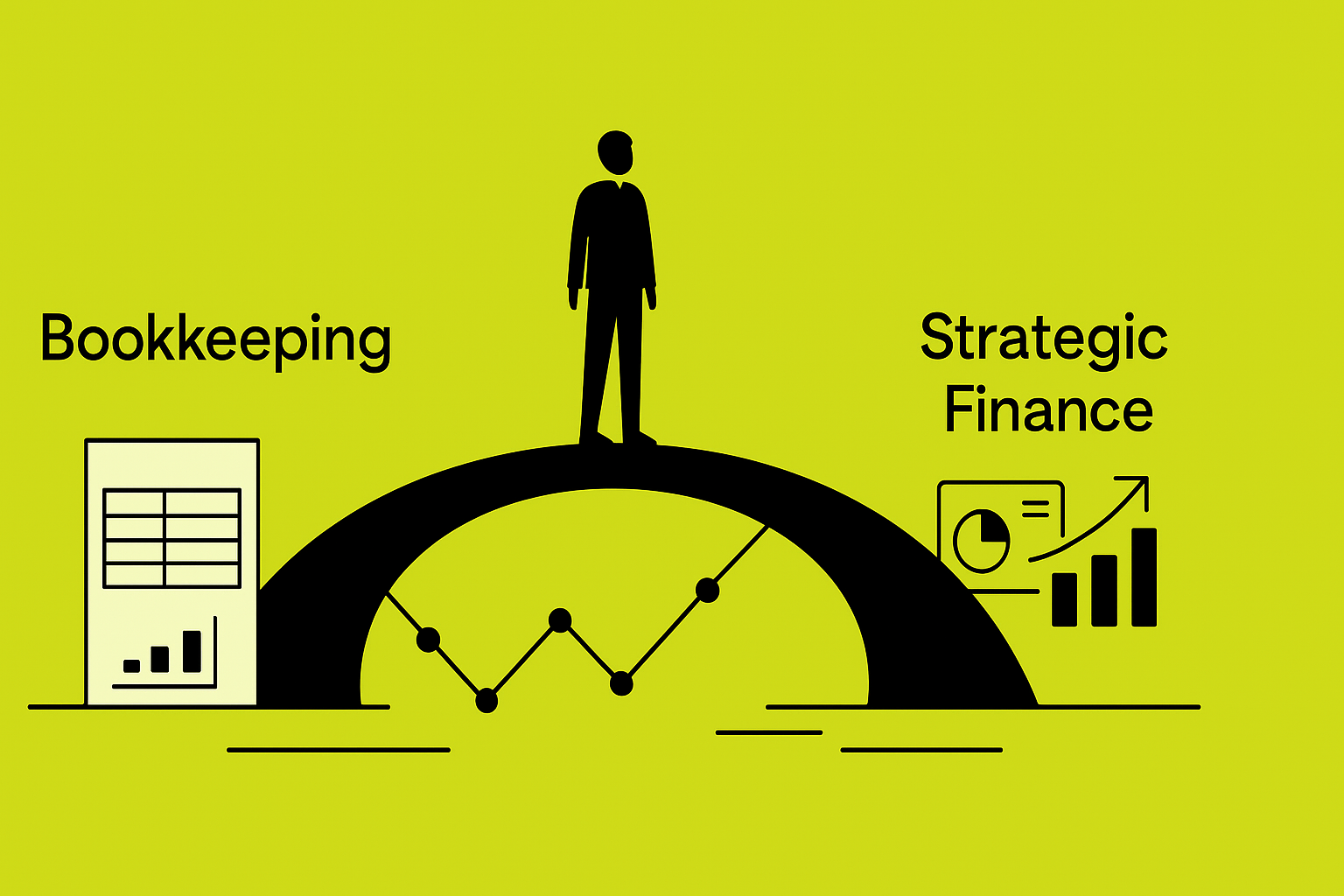The Hidden Limits of Bookkeeping
For most growing businesses, bookkeeping feels like enough. The numbers are clean, the accounts reconcile, and reports arrive on time. It creates a sense of order, a comfort in knowing that the financials are under control. But beneath that surface, a quiet problem begins to grow. Bookkeeping tells you where your money went, not where it should go next. It is reflective, not predictive. The moment a company begins to scale, that distinction becomes critical.
At Quantro, we see this pattern every day. Founders invest in excellent bookkeepers who keep their accounts organised, yet still find themselves unsure about cash flow, margins, or investment timing. The numbers are technically right but strategically incomplete. That is because traditional bookkeeping was never designed to guide decisions, only to record them. When a business starts growing faster than its financial insight, bookkeeping alone stops being a safety net and starts becoming a blindfold.
Bookkeeping is essential for every business. It records transactions, ensures compliance and keeps financial data organised. For early-stage companies, that foundation is enough; it provides clarity and structure. But as a business grows, the limits of bookkeeping become clear. Recording what happened in the past no longer provides enough information to guide the future.
The problem is that bookkeeping is reflective, not predictive. It explains where the money went but not what to do next. When revenues rise, costs spread and operations expand, the financial picture becomes more complex. Founders may see growth on paper but still struggle to understand cash flow, profitability or investment timing. These are strategic questions, and bookkeeping alone cannot answer them.
Many growing businesses try to solve this by improving their systems or hiring more bookkeepers, but the real issue is not the data, it is the absence of analysis. Numbers must be connected, interpreted and projected into future scenarios. That is where strategic finance begins. It transforms financial information into insight, helping leaders plan, prioritise and grow with confidence.

Strategic finance begins where bookkeeping ends. It takes the same financial data that once sat quietly in ledgers and turns it into a forward-looking decision-making tool. Instead of asking what happened last month, it asks what might happen next quarter, and what actions will shape that outcome. It connects financial understanding to business planning, allowing leaders to see the cause and effect of their choices with far greater clarity.
At its core, strategic finance is about alignment. It aligns numbers with strategy, cash flow with growth, and ambition with capability. It gives decision-makers not only visibility over the current financial position but also the ability to model different futures. This means moving beyond the traditional reports and building tools that allow for forecasting, scenario planning and performance tracking in real time. It is a shift from recording facts to influencing direction.
At Quantro, this process begins with simplification. We take control of a client’s financial data, clean it, and transform it into a format that is both structured and meaningful. From there, we build insights that help founders focus on what truly drives their business. We show them where they are strong, where they are exposed, and what changes will have the most significant impact on growth. The result is not just a clearer picture of the business, but a plan of action that connects day-to-day operations with long-term goals.
When done well, strategic finance becomes part of every major decision. It informs hiring plans, pricing strategies, market expansion, and investment choices. It brings the future into every financial conversation, turning uncertainty into structure and instinct into strategy. For growing businesses, this is the difference between reacting to numbers and leading with them.
At some point, every growing business reaches a stage where bookkeeping alone no longer provides the clarity it once did. The reports are accurate, but they stop being useful for decision-making. You can see what happened last month, yet you cannot tell why it happened or what will happen next. When financial data becomes purely descriptive rather than strategic, the business has already outgrown bookkeeping.
One of the most common signs is recurring cash flow pressure despite profitability. Bookkeeping shows profit, but not timing. Without a forward-looking view of payments, costs and collections, even a profitable company can struggle to manage liquidity. This is where strategic finance adds value, linking financial information to business reality and helping founders anticipate challenges before they occur.
Complexity is another clear signal. As a company expands into multiple products or markets, the data multiplies and simple systems begin to strain. Spreadsheets become slow, errors creep in and financial management turns reactive rather than proactive. When that happens, it is time to move from keeping records to managing the future. Strategic finance brings structure, rhythm and foresight; the tools every scaling business needs to stay in control.

Between the limits of bookkeeping and the cost of hiring a full-time Chief Financial Officer, there is a valuable middle ground. This is where the fractional CFO comes in. For many growing businesses, it offers the ideal balance between strategic insight and affordability. A fractional CFO provides the same level of financial expertise as a full-time executive but on a flexible, scalable basis that adapts to the pace of growth.
At Quantro, we find that this model works best for companies entering their next stage of expansion. They have reliable bookkeeping and basic reporting in place but need guidance on how to plan ahead, manage cash flow and invest with confidence. We step in to translate data into strategy, building financial models, forecasts and performance dashboards that help leadership make informed decisions. The founder can stay focused on operations while knowing that the financial direction is sound.
The advantage of a fractional CFO is that it bridges the gap between control and strategy. It turns raw numbers into insight, provides clarity where there was uncertainty, and creates a rhythm for reviewing and refining performance. Most importantly, it gives growing businesses access to the same strategic finance capabilities as larger organisations, without the full-time cost. For many founders, it is the first real step towards financial maturity.
The value of strategic finance becomes clear when numbers start driving real change. At Quantro, we often work with companies that are profitable on paper but still face monthly cash flow challenges. The issue is rarely about revenue; it is about timing, structure and visibility. Without a clear understanding of how money moves through the business, even successful companies can find themselves short of liquidity when they need it most.
By taking a deeper look at their financial data, we uncover patterns that bookkeeping alone cannot show. We analyse payment cycles, supplier terms and spending behaviour, then translate those insights into action. Sometimes that means renegotiating contracts, improving credit terms or adjusting pricing strategy. Other times, it is about helping leadership decide where to invest or when to hold back. The goal is always the same: to turn financial data into meaningful decisions that improve performance.
For many of our clients, these adjustments have a visible impact within months. Cash positions stabilise, costs reduce and planning becomes more confident. With the right strategy in place, the numbers start to tell a different story: one of control, not uncertainty. Strategic finance transforms financial management from an administrative task into a driver of growth.
Many founders wait too long to bring strategy into their finances. They see CFO support as something for later, when the business is larger or more complex. In truth, the benefits of strategic finance begin long before that stage. Having the right financial insight early allows a company to grow with intention rather than reaction. It ensures that every decision, from pricing and hiring to expansion and investment, is grounded in data, not instinct.
At Quantro, we have seen how transformative this can be. Businesses that once struggled with cash flow, confidence or direction often find stability within months of introducing a fractional CFO. They gain visibility over their numbers, clarity around their priorities and confidence in their next steps. The result is not just better financial control, but better leadership. Strategic finance turns uncertainty into structure and transforms growth from something that happens to the business into something it actively drives.
If you are ready to move beyond bookkeeping and bring strategic clarity to your finances, we would love to help. Book a meeting with our team to explore how Quantro can design a tailored financial strategy for your business; one that gives you not just data, but direction, focus and the confidence to grow.
More from Quantro
Innovative cash flow management strategies are crucial for any business's survival and growth. In this blog, we cover optimising payment cycles, using financial tools for passive income, leveraging technology for real-time insights, and building a cash-savvy culture. The article provides practical advice, aiming to transform routine financial management into a strategic asset that enhances operational efficiency and financial stability, equipping businesses to navigate complex economic landscapes effectively.
Read More →Explore the complexities of scaling operations in service businesses. We look into recognising the right time to scale, addressing operational challenges, leveraging technology efficiently, maintaining exceptional customer experience, and managing team dynamics effectively. We use practical examples of how to use key performance indicators to navigate growth and ensure that your business not only expands in size but also enhances its capabilities and maintains its core values. Perfect for business leaders seeking to understand the nuances of sustainable growth in the service sector.
Read More →